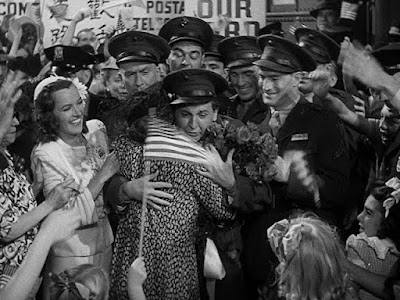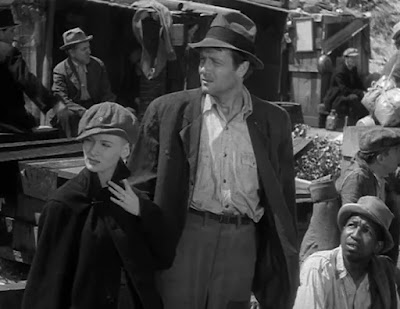 Hail the Conquering Hero (Preston Sturges, 1944) You can take "Semper Fi" just a little too far sometimes. Small-town schnook Woodrow Lafayette Pershing Truesmith (Eddie Bracken) is drinking alone in a bar. Washed out of his beloved Marine Corps for chronic hay fever, he's been working in a San Diego shipyard ever since and writing letters, full of fiction, to his Mom, a Marine widow, that he's fighting overseas. He spots a group of jarheads (led by Sturges regular William Demarest) trying to buy a communal beer with 15¢ between 'em, and buys them a round.
Hail the Conquering Hero (Preston Sturges, 1944) You can take "Semper Fi" just a little too far sometimes. Small-town schnook Woodrow Lafayette Pershing Truesmith (Eddie Bracken) is drinking alone in a bar. Washed out of his beloved Marine Corps for chronic hay fever, he's been working in a San Diego shipyard ever since and writing letters, full of fiction, to his Mom, a Marine widow, that he's fighting overseas. He spots a group of jarheads (led by Sturges regular William Demarest) trying to buy a communal beer with 15¢ between 'em, and buys them a round.When they hear his tale of woe and subterfuge, the Marines take sympathetic pity on Woodrow, and concoct a story that reads like an invasion plan. Just back from Guadalcanal, they pin their medals on the kid, insist on escorting him home, and make up a cock-and-bull story about him being a hero. Anything for dear ol' Mom. But, as things tend to do in Sturges comedies, things accelerate in a dither of cross-purposes and crushed dialogue. Caught up in the manufactured patriotic fervor, the whole town sings Woodrow's praises, the bank forgiving Mom's mortgage and nominating him for Mayor (with the election only two days away!). Woodrow's genuinely appalled, but the Marines are steadfast in seeing Woodrow's dreams come true, no matter how much he protests, no matter how much he whines. No matter how much guilt he feels.

























